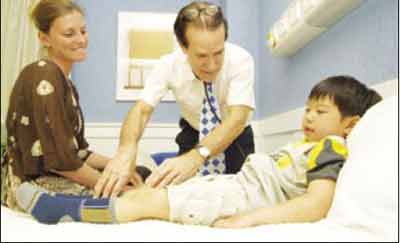Society
A life-changing day
Updated: 2011-02-04 13:52
By Lin Jing (China Daily USA)
But Lipson saw a market for healthcare services. "We got the idea that perhaps we could make a small model of what we thought the ideal hospital would be, and start by first serving the international population in Beijing."
However, opening a foreign hospital in China then was not easy, with complications both from regulatory and social perspectives.
"A lot of people laughed at us and said, oh, you cannot have a private hospital in a socialist country; you cannot possibly make enough money to survive," she said.
But Lipson and her team persisted. They started talking to the Ministry of Health. After four years' negotiation, they found an official who thought the hospital might be good as an experiment, and an opportunity to serve Beijing's international community.
But despite the approval, more challenges lay ahead.
|
 A doctor treats a child at United Family Healthcare. [Provided to China Daily] |
Before the hospital could open, 180 approvals were needed from various government departments, including the Ministry of Construction. And almost all the building material had to be imported because material suitable for a modern hospital was just not available in China.
Staffing the hospital with the best clinicians was also challenging. "Since nobody knew whether our project would succeed or not, and because it was a very controversial model for China, it was really hard to persuade doctors to give up their practices in the US to come here and also to ask Chinese senior doctors to let go of their iron rice bowls to join this little experimental hospital in Beijing," she said.
But the situation now is vastly different. On Nov 26 last year, China's State Council approved permits to foreign companies to establish medical institutions in China and relax restrictions on social capital's investments in medical organizations.
Lipson welcomed the State Council's decision, which would increase the number of companies interested in the market.
UFH's patient base comprises 60 percent foreigners and 40 percent locals; Lipson is confident the market will expand as more providers of high-end premium healthcare enter the market, and with the support of the government. As well, more affluent Chinese will want to choose private healthcare, she said.
Years of business and life experience has made her feel much more connected with China.
"Beijing is my hometown now," she said, with a smile. She's married to a US journalist and author who has been in China for 21 years. They have three sons, all of whom speak good Mandarin.
She enjoys the beautiful views and village lifestyle in the countryside, and has built a weekend house near the Great Wall, with orchards around.
"I love the diversity in Beijing, the combination of deeply historically significant sites together with the modern buildings and conveniences. I love the fact that it is not so far or difficult to get to the beautiful countryside to enjoy fresh air."
China Daily
E-paper

Ear We Go
China and the world set to embrace the merciful, peaceful year of rabbit
Carrefour finds the going tough in China
Maid to Order
Striking the right balance
Specials

Mysteries written in blood
Historical records and Caucasian features of locals suggest link with Roman Empire.

Winning Charm
Coastal Yantai banks on little things that matter to grow

New rules to hit property market
The State Council launched a new round of measures to rein in property prices.
